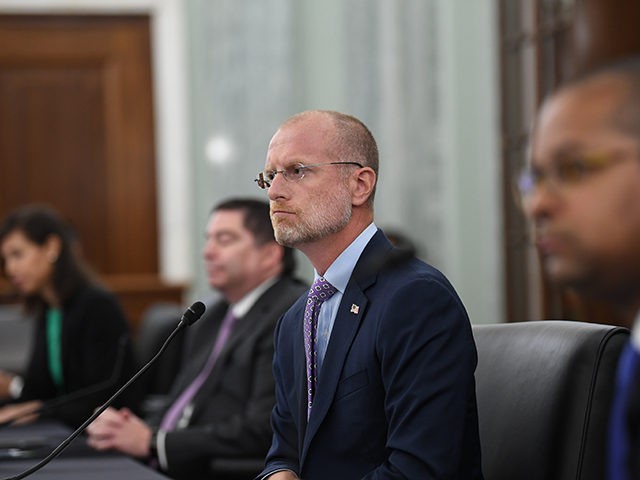Federal Communications Commission (FCC) Commissioner Brendan Carr unveiled his outline for tackling big tech censorship, dominance on the Internet, and anticompetitive practices in an op-ed on Monday.
Carr wrote his op-ed in Newsweek as Republicans, Democrats, and the Trump administration have taken an increasing interest in tackling the ill-perceived effects of big tech companies.
The FCC commissioner noted that there remains a vigorous debate on the “Right” between more traditional conservatives and libertarians who do not want to impose regulations or antitrust policies on big tech companies, and more populist conservatives and nationalists who want to break up big tech companies and address Section 230 of the Communications Decency Act.
Carr charged that this contrast between the opposing sides is a “false choice” and that the Right can apply a “light-touch” regulatory towards big tech without implementing new regulations or breaking up companies.
He wrote:
This is a false choice, of course. And this framing ignores the ways in which Big Tech has accumulated and now wields its power. A handful of corporations with state-like influence now shape everything from the information we consume to the places where we shop. These corporate behemoths are not merely exercising market power; they are abusing dominant positions. They are not simply prevailing in the free market; they are taking advantage of a landscape that has been skewed—by the government—to favor their business models over those of their competitors. Crony capitalism is not free enterprise.
To address the problems surrounding big tech, Carr, a former FCC general counsel, called for policies that would enforce transparency, accountability, and user empowerment.
Carr said that enforcing a “transparency” rule would reveal how Google manipulates its search results to the detriment of small businesses, how Twitter bans users, and how YouTube can demonetize users who risk years of capital and time investing in their online businesses.
The commissioner noted that the FCC instituted transparency standards for Internet Service Providers (ISPs) through their Restoring Internet Freedom Order, the order which repealed the Obama-era net neutrality regulations.
FCC Chairman Ajit Pai has also called for transparency standards to address questions surrounding big tech companies’ manipulation of their search algorithms and content moderation practices.
Carr also called for the Federal Trade Commission (FTC) to ramp up its review of big tech companies. He wrote:
When Big Tech represents that, for all of their content moderation practices, they do not engage in partisan, political takedowns, they should be held accountable for those representations. This is where the FTC should step up its scrutiny of Big Tech. It can examine Internet companies and their commitments through the lens of the agency’s unfair or deceptive business practices authority, and it should start doing so with a vigor commensurate with the power wielded by those corporations.
Carr said that users should be empowered with the ability to control their own user experience on their Internet platform of choice, so that they do not have to curate their news or social feed through Facebook, Twitter, or Google’s bias filters.
Carr wrote:
As the FCC takes up the administration’s Section 230 petition, we should do so mindful of how we can return power to Internet users over their online experiences.
One idea is to let consumers turn off the bias filters. Right now, Facebook and Twitter bring in outside “fact checkers” (read: political actors) to provide their takes on your posts. Why not let the consumer decide? If you want MSNBC, Fox News or any other entity to filter your feed, click that box. If you want an unfiltered, Wild West timeline, choose that option.
On Big Tech, conservatives in Washington should stand for more than nothing. There is a path forward that promotes transparency, accountability and user empowerment.
Carr concluded, “As William F. Buckley, Jr. famously wrote, ‘I will not willingly cede more power to anyone, not to the state, not to General Motors’—and, I would add, not to Big Tech.”
Sean Moran is a congressional reporter for Breitbart News. Follow him on Twitter @SeanMoran3.

COMMENTS
Please let us know if you're having issues with commenting.